8 Types of Metal Fencing - Different Uses of Metal Fencing
Written by Ivy
Dec 14 2022
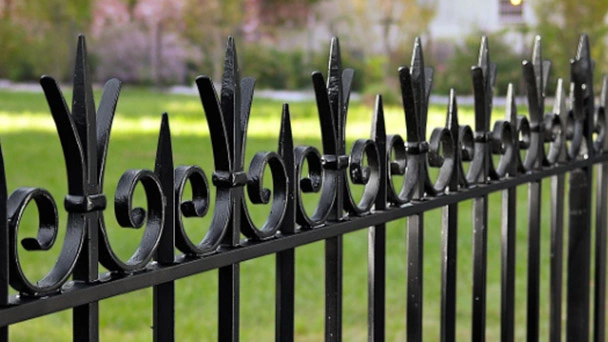
What are the advantages of installing a fence, and why? Are you unsure and overly concerned about putting up a fence around your property?
In order for you to select the ideal fencing for your yard, we'll explain the various metals and designs used in fencing. We'll also go over the costs, advantages, and disadvantages of each type.
8 Types of Metal Fencing
1. Wrought Iron Fences
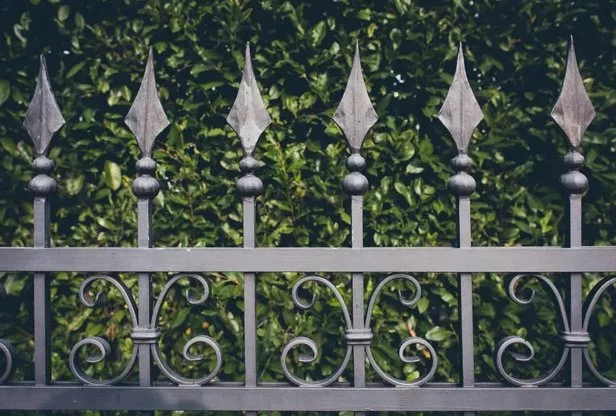
By heating iron and shaping it into different shapes, wrought iron is a traditional fencing material. Infinite customization options are possible despite the labor-intensive process' high cost. These elegant fences have graced yards for centuries, and there are several styles to suit your tastes, such as:
- Flat top
- Arched top
- Fleur-de-lis
- Spearhead
- Ball top finish
- Closed iron
- Straight top
- Ornamental
Because of its strength and design, wrought iron is appropriate for both functional and decorative uses. As long as your dog can't fit through the pickets, it can keep dogs inside. To match your outdoor decor, choose from a variety of powder-coated colors. Additionally, powder coating increases resistance to rust and scratches.
Many wrought iron fences are actually made of other materials, which you might not be aware of. Cast iron fences are a popular alternative since they're cheaper. Unlike wrought iron, which is shaped with tools, cast iron is poured into a mold. Cast iron is more brittle than wrought iron, making it more likely to break under stress.
Other materials like steel are sometimes advertised as wrought iron because of the similar style. However, since they are less expensive and offer sufficient strength and aesthetic appeal for the average homeowner, many people voluntarily select these alternatives.
Pros:
- Durable
- Visually appealing
- Custom design options
- Secure
Cons:
- Expensive
- Hard to install
- Provide no privacy
- Susceptible to rust and corrosion if not powder-coated, painted, or sealed regularly (especially in coastal climates)
Cost: $26-$34 per linear foot
2. Aluminum Picket Fences
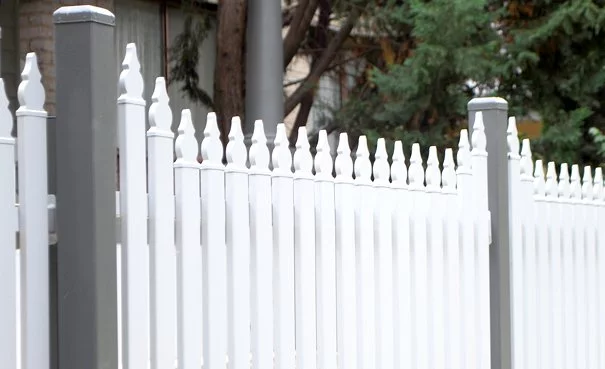
Is rust your main worry? Pool fences made of aluminum work well because they are naturally rust-resistant. These lightweight fences are typically less expensive than wrought iron fences. While the majority of aluminum fences are simply constructed with a top rail, bottom rail, and pickets, some are patterned after the more ostentatious wrought iron designs. Various powder-coated colors are also available for you to choose from.
Are you concerned that your small furry friend won't fit between the pickets? Install puppy pickets onto your aluminum fence to make the gaps smaller. For small dogs or puppies, this addition is a great option. Aluminum might not be impenetrable to humans, though. If you install it with screws, a burglar could undo them and enter.
Although wrought iron fences require less upkeep, aluminum fences are less durable. Objects like storm debris can cause aluminum fences to bend. If you want a stronger fence, ask your local fence expert for higher-grade aluminum, but be aware that it will cost more.
Pros:
- Low-maintenance
- Cost-effective
- Many styles and color options
- Recyclable
Cons:
- Compromised security and durability
- Provide no privacy
Cost: $19-$76 per linear foot
3. Steel Picket Fences
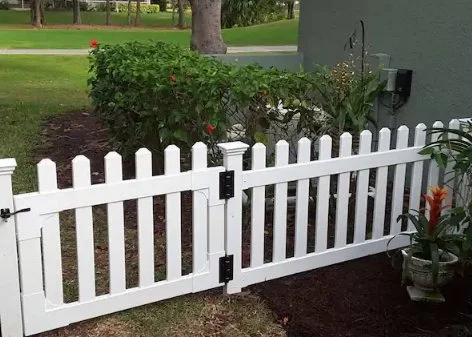
Remember how companies often use steel for wrought "iron" fences? This is due to the fact that steel fencing is more cost-effective and is available in many of the same styles as wrought iron fencing. Both rivets and welding can be used to assemble it.
Steel, however, is heavy and challenging to install. Due to this feature, it is not the best option for DIYers, but a professional can handle it just fine. While galvanized steel can withstand corrosion, steel fences are not impervious to rust.
Pros:
- Comes in many styles
- Adds value to homes
- Galvanized steel can resist corrosion
Cons:
- Heavy and hard to install
- Not resistant to rust unless it's galvanized
- Provide no privacy
Cost: $23-$45 per linear foot
4. Chain-Link Fences
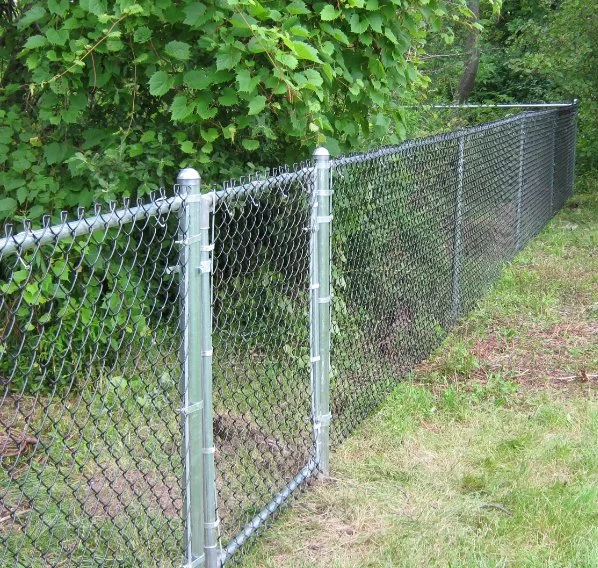
Not as concerned with looks? Chain-link fences are a common fence option for homeowners and business owners because they are functional and reasonably priced. Since they have no gaps and can be tall enough to prevent dogs from high-jumping, they are also well-liked by dog owners. You can pick from varieties in different colors that are vinyl-coated, stainless steel, aluminum, or galvanized steel.
Chain-link fencing is one of the few metal fence types that doesn't increase property value due to its unattractive appearance. There are, however, a few ways to personalize or enclose your chain-link fence.
A human intruder could easily climb or cut through chain-link fencing, despite the fact that it generally keeps children and pets inside. Although many residential areas forbid it for safety reasons, you might be able to install barbed wire on top.
Pros:
- Budget-friendly
- Low maintenance
- Easy to install and repair
- Great for dog runs
Cons:
- Provide no privacy unless you install slats
- Not secure
- Not visually appealing
- Doesn't increase property value
Cost: $12-$33 per linear foot
5. Wire Fences
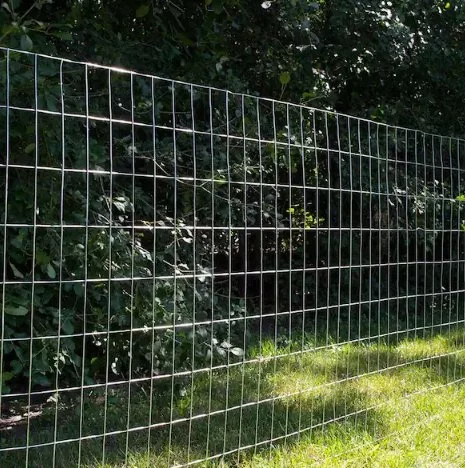
Want safety on a tight budget? One of the least expensive fence types that effectively keeps animals in or out is wire, which makes them ideal for gardens. They are also simple to install and fix. Simple wires strung between posts and wire mesh in frames are the two basic types of wire fences. Here are the most common styles:
- Chicken wire
- Hog wire
- Welded wire
- Barbed wire
- Razor wire
Although a wooden frame might make wire fencing more attractive, it isn't the most attractive type of fencing. Check your local laws before installing because barbed and razor wire are frequently prohibited in residential areas.
Pros:
- Budget-friendly
- Easy to install and repair
- Secure for gardens and animal enclosures
Cons:
- Not visually appealing
- Some types are not allowed in residential areas
Cost: $3-$5 per linear foot
6. Aluminum Slat Fences
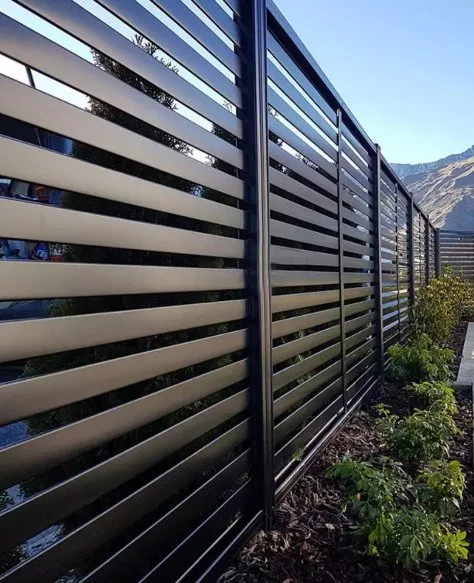
Despite wanting more durability, do you like the way wooden slat fences look? Instead, use fencing made of aluminum slats. Although it has a similar private or semi-private appearance, it is termite-resistant. To match your decor, choose from a variety of colors.
Aluminum slat fences are resistant to rust like aluminum picket fences, but they are vulnerable to denting when objects strike them. Due to the amount of material required, they can also be quite expensive in comparison to other styles. Many home improvement stores sell DIY kits for building metal slat fences.
Pros:
- Provides privacy
- Comes in many colors
- DIY-friendly
- Rust-proof
Cons:
- Expensive
- Prone to denting
Cost: $63-$70 per linear foot
7. Corrugated Metal Fences
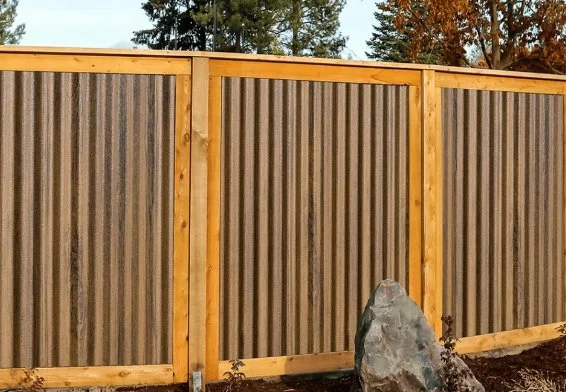
More privacy is what you seek. A DIY-friendly option, a corrugated metal fence offers complete privacy. Combine wood panels and corrugated metal panels for a colorful, contemporary look. To prevent rust, galvanized steel is the most common material used to construct corrugated metal fences. Since they are recyclable, they are also environmentally friendly.
Not everybody finds this fence style to be visually appealing, but it can give your yard a modern or rustic look. They aren't available in a wide variety of shapes or styles, though you could always paint or cut them. They might also have jagged edges that make them dangerous for kids. Corrugated metal is not a good option for acoustic fencing because it can cause sound to reverberate in a yard.
Pros:
- Provide privacy
- DIY-friendly
- Can be combined with wooden fencing
- Rust-resistant if they're made of galvanized steel
- Eco-friendly
Cons:
- Debatable aesthetic appeal
- Sharp edges
- Limited color and shape options
Cost: $7-$13 per linear foot
8. Metal Privacy Screen Fences
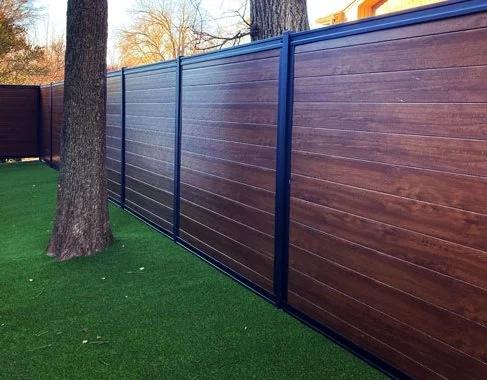
Metal privacy screens might be an option for you if you like decorative fences but don't like pickets. To improve the aesthetics of your outdoor space, these fences have intricate shapes cut out of them. They allow some light to pass through while offering privacy. In home improvement stores, you can buy metal privacy screens.
However, many metal privacy screen fences serve purely decorative functions. Instead of ground-based fence posts, they come with stand poles. They are not the best for security reasons because of this feature. A metal privacy screen that is firmly rooted in the ground might need to be installed by a professional. They work best in small spaces because they are expensive and made of high-quality materials.
Pros:
- Aesthetically appealing
- Provide privacy
- Let light through
Cons:
- Expensive
- Not always secure
Cost: $20-$66 per linear foot
Why Choose a Metal Fence?
Strong and durable metal fence is available. Because of its extreme strength, it keeps its original qualities even after years of use. Strong weather conditions are easily handled by the Metal Fence. You won't need to regularly spend money on repairs if you give it proper care. Metal fences offer more affordable options as well.
Things to Consider before Choosing a Metal Fence
You might be unsure of whether you want metal at all or you can't decide on a metal fence style. Prior to making a decision, take into account the following factors.
- Cost: Although ornamental metal is the priciest type of fence, wire and chain-link are some of the most cost-effective options.
- Aesthetic Appeal: Metal fences can be simple or stunning. However, the labor-intensive process required to create beautiful metal has a high cost.
- Visibility and Privacy: When you don't want to obstruct your view, metal fences are the best option because they typically have excellent visibility. Only a few metal fence privacy options are available, though. With the addition of slats, screens, or other materials, you might be able to make some metal fences private, but these fences are typically more expensive and don't always provide privacy.
- Security: Pets and children can be contained by metal fences because they are secure enough. The height and space between the pickets, though, must be taken into consideration. To deter trespassing, pick a metal fence that is difficult to scale or has spikes on top.
- Durability: Metal fences are second in strength only to those made of masonry. Aluminum is the least strong metal that can be used for fences, while iron is. Even the most flimsy metal fence, though, is more durable and lasts longer than a wooden or vinyl fence (when maintained properly).
- Landscaping: Your fencing plans may occasionally be hampered by nature. Make sure your fencing material won't rust from the additional moisture if your lawn has water features. If your yard slopes, you should consider aluminum or chain-link fences because you can adjust them to fit the contours of the land.
- Ease of Installation: You can construct wire, chain-link, corrugated metal, aluminum slat, and aluminum picket fencing by yourself, using kits from home improvement stores, or using pre-made materials. Other types of metal fencing, however, can be bulky or require welding, so a professional should handle those.
- Maintenance Needs: Although no type of fencing is completely maintenance-free, metal fencing needs less upkeep than other types. You'll need to paint or seal the metal on a regular basis if the particular metal you use is prone to rust. Any metal fencing will occasionally need to be washed to remove dirt. To lessen the likelihood of rust, keep metal fences dry.
- Ease of Repair: Fences made of wire and chain-link mesh can be easily repaired by simply cutting away the damaged area and adding fresh wire or chain-link mesh in its place. If a damaged panel is found on another type of metal fencing, the entire panel must be replaced. Repairing them might necessitate hiring a fencing contractor.
The Bottom Line
A beautiful way to enclose your property and keep kids and pets inside the yard safely is with a metal fence. Although these kinds of fences require some maintenance, preventive work done throughout the year—such as keeping landscaping trimmed back from the fence and fixing damage as soon as it occurs—can help keep your fence in good condition.
Get quotes from several reputable fence installation companies, and be sure that you know the exact boundaries of your property before any work begins. It would be a great idea to conduct a survey right away if you don't already have one.
FAQ About the Types of Metal Fencing
What Type of Metal Fencing is the Best for Dogs?
Chain-link fencing is best for dogs because:● It doesn't have gaps for small dogs to squeeze through
● You can build it tall so dogs can't jump over
● You can install it with a concrete base so your dog can't dig underneath
● You can add privacy slats or screens to block the view of excitable dogs
● It's affordable for large dog runs
Another benefit of aluminum fences is that you can add puppy pickets to keep small dogs contained. For large or high-jumping dogs, install a tall aluminum fence.
What Types of Metal Fences Don't Rust?
Rust won't occur on aluminum, galvanized steel, or surfaces with a powder coating. Chain-link fences with vinyl coating also resist rust.
To minimize the chance of corrosion:
● Paint or coat your existing metal fence
● Remember that coated metals can rust if the protective layer is scratched
● Look for damage regularly so you can reapply the protective coating
What Type of Metal Fencing Lasts the Longest?
Iron fences are durable if they are kept up properly due to their strength. After hundreds of years, some wrought iron fences are still in place. If you want a fence that requires less maintenance, aluminum fences are your next best option. Due to their resistance to rust, they can last for many years.
Latest Updated
- Benefits of Bugleweed - 7 Science-backed Health Benefits
- Bugleweed Dangers & Side Effects - Is It Poisonous?
- How to Plant Evergreen Trees - What You Should Know
- When to Plant Evergreens - Grow Guide for Evergreen Trees
- 12 Wonderful Evergreen Shrubs for Your Garden
- 12 Popular Evergreen Plants with Pictures for Beginners
- When And How To Prune A Lilac Bush Like a Pro
- How to Grow & Care for Lilac Vine (Hardenbergia Violacea)
- Japanese Lilac Tree (Syringa Reticulata) Care & Propagation Guide
- Shumard Oak Pros and Cons - What to Know
Popular Articles
- Winter maintenance of Antirrhinum Majus
- How to Grow Terminalia Mantaly Tree
- How to Grow and Care for Crossostephium Chinense
- How to grow Antirrhinum Majus in spring
- Peristeria Elata (Dove Orchid) Profile: Info & Care Guide
- Underwatered Snake Plant (Sansevieria Trifasciata) - Signs And How To Fix
- How to Care for Brazilian Jasmine Plant (Mandevilla Sanderi)
- How to Grow & Care for Graptopetalum Purple Delight in Summer
- Rosa Chinensis (China Rose): Plant Growing & Care Tips
- How to Care for Baby Sun Rose (Aptenia Cordifolia)